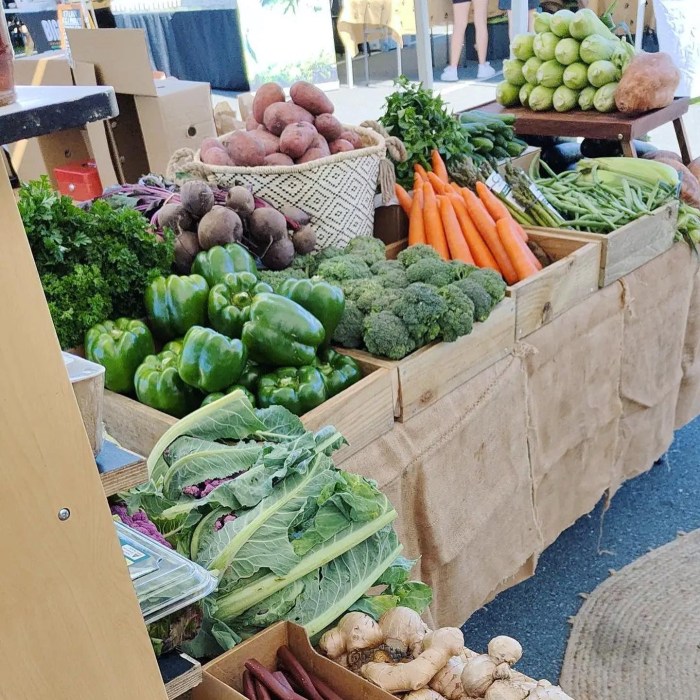Farmers Market Health Tips: A Guide to Nutritious Choices
Exploring the world of farmers market health tips, we delve into the benefits of fresh produce, how to make smart choices, and the nutritional value that can transform your meals. Join us on this journey towards healthier eating habits.
Importance of Farmers Markets for Health

Shopping at farmers markets can have a significant positive impact on health by providing access to fresh and nutritious produce.
Fresh Produce and Health Benefits
- Locally grown fruits and vegetables are often harvested at peak ripeness, which means they are packed with essential vitamins, minerals, and antioxidants.
- By consuming a variety of fresh produce from farmers markets, individuals can boost their immune system, improve digestion, and lower the risk of chronic diseases.
- Farmers markets also offer organic options, which are free from harmful pesticides and chemicals, promoting overall health and well-being.
Supporting Local Farmers for Community Health
- Buying from local farmers at farmers markets helps support the local economy and agricultural community, contributing to overall community health and well-being.
- When consumers purchase directly from farmers, they establish a connection with where their food comes from, fostering a sense of community and promoting sustainable agricultural practices.
- Supporting local farmers also helps preserve farmland, biodiversity, and traditional farming methods, which are essential for environmental health and sustainability.
Tips for Choosing Healthy Foods at Farmers Markets
When shopping at farmers markets, it's essential to make informed choices to ensure you're selecting the healthiest options available. Here are some tips to help you choose the best foods for your well-being.
Identifying Organic Produce
- Look for the "Certified Organic" label: Organic produce is grown without synthetic pesticides or fertilizers, so make sure to look for the official certification label to ensure you're getting organic products.
- Ask the farmer: If you're unsure whether a product is organic, don't hesitate to ask the farmer directly. They can provide you with information about their farming practices.
- Inspect the produce: Organic fruits and vegetables tend to have fewer blemishes and a more vibrant color compared to conventionally grown produce.
Determining Freshness of Fruits and Vegetables
- Check for firmness: Fresh fruits and vegetables should feel firm to the touch, without any soft spots or bruises.
- Examine the leaves: For leafy greens, look for crisp and vibrant leaves without wilting or yellowing.
- Smell the produce: Fresh fruits and vegetables have a fragrant aroma, so use your sense of smell to detect freshness.
Benefits of Choosing Locally Grown Foods
- Higher nutrient content: Locally grown foods are often harvested at peak ripeness, retaining more nutrients compared to produce that has been transported long distances.
- Supporting the local economy: By buying locally, you're supporting small-scale farmers and contributing to the economic vitality of your community.
- Reduced environmental impact: Locally grown foods require less transportation, reducing carbon emissions and promoting environmental sustainability.
Nutritional Value of Farmers Market Produce

When it comes to comparing the nutritional value of fresh produce from farmers markets and supermarket produce, there are notable differences that can impact our health and well-being
Nutrient-Rich Foods at Farmers Markets
At farmers markets, you can find a wide variety of nutrient-rich foods that are packed with essential vitamins, minerals, and antioxidants. Some examples include:
- Dark leafy greens like kale and spinach, which are rich in vitamin K, vitamin A, and folate.
- Colorful bell peppers, which are high in vitamin C and antioxidants.
- Sweet potatoes, a great source of vitamin A, fiber, and potassium.
- Berries such as blueberries and strawberries, known for their high levels of antioxidants.
Seasonal Variations and Nutritional Content
Seasonal variations can have a significant impact on the nutritional content of fruits and vegetables. Produce that is in season is typically fresher, tastier, and more nutrient-dense compared to out-of-season produce that may have been stored for longer periods or transported from far distances.
For example, tomatoes in the summer are not only more flavorful but also higher in nutrients like vitamin C and lycopene compared to off-season tomatoes.
Meal Planning with Farmers Market Produce
When it comes to meal planning with farmers market produce, the key is to incorporate a variety of fruits and vegetables into your daily meals. Not only does this ensure a well-balanced diet, but it also allows you to enjoy the unique flavors and nutritional benefits of fresh, locally grown produce.
Ideas for Incorporating Farmers Market Produce into Daily Meals
- Start your day with a fruit smoothie using fresh berries and bananas from the farmers market.
- Add a colorful mix of vegetables, such as bell peppers, zucchini, and cherry tomatoes, to your salads or stir-fries.
- Roast a medley of root vegetables like carrots, beets, and sweet potatoes for a hearty and nutritious side dish.
- Snack on crunchy sugar snap peas or radishes with hummus for a healthy mid-day pick-me-up.
- Incorporate fresh herbs like basil, parsley, and cilantro into your dishes for added flavor and nutrients.
Benefits of Meal Prepping with Fresh Produce
- Save time during the week by prepping and storing fruits and vegetables in advance for quick and easy meals.
- Reduce food waste by using up all your farmers market produce in planned meals throughout the week.
- Ensure that you always have healthy options on hand, making it easier to stick to a nutritious eating plan.
- Enjoy the vibrant colors and flavors of fresh produce, which can make mealtime more enjoyable and satisfying.
Final Conclusion

In conclusion, farmers markets offer a plethora of health benefits through their fresh, locally sourced produce. By incorporating these tips into your shopping and meal planning, you can enhance your well-being and support your community's health. Make the most of your next trip to the farmers market with these valuable insights.
Quick FAQs
How can I identify organic produce at farmers markets?
To ensure you're buying organic, look for the USDA organic label or ask the farmer directly about their growing practices.
What are some nutrient-rich foods commonly found at farmers markets?
You can find a variety of nutrient-rich foods like kale, berries, tomatoes, and sweet potatoes at farmers markets.
How do seasonal variations impact the nutritional content of fruits and vegetables?
Seasonal variations can affect the taste and nutritional content of produce, with some fruits and vegetables being more abundant and nutritious during certain times of the year.




